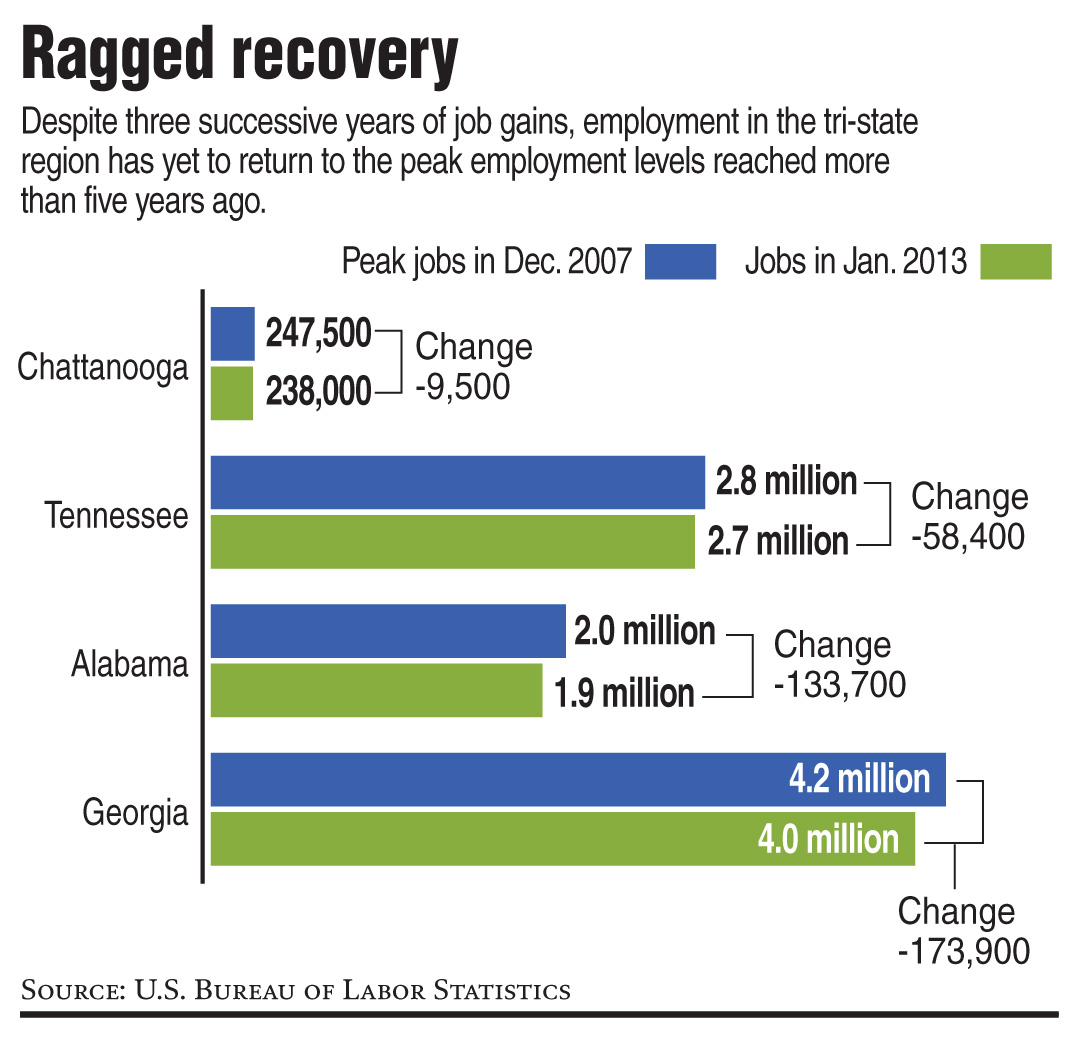JOBS GAPBelow are the number of jobs needed to return employment to pre-recession levels given the economy's rate of growth and new workforce entrants:* Tennessee: 196,000* Georgia: 478,000* Alabama: 233,000Source: The Hamilton Project at the Brookings Institution
Hixson resident Dennis Howard says he lost his job last week after working for Bunge Oils for 20 years, but he's hoping to land work as an assembler for another company in the city.
"It's tough," Howard, 55, said at a jobs fair. "Especially at my age."
Howard has more than his age going against him.
Even though the recession officially ended three years ago, the slow recovery hasn't come close to catching up on the number of jobs shed then, even as new entrants come into the workforce.
In just Tennessee, Georgia and Alabama, it will take more than 900,000 additional jobs to bring the states' employment-to-population ratio to its pre-recession level, according to The Hamilton Project, an economic policy initiative housed at the Brookings Institution in Washington, D.C.
Nationally, it will take 10.2 million more jobs, the group said.
When The Hamilton Project began its calculations in May 2010, the group assumed the country would need 125,000 jobs per month to account for the labor force entrants.
But because of the sluggish recovery, The Hamilton Project expects that at a job creation rate of 208,000 per month -- the average rate for the best year of job creation in the 2000s -- it will take until 2020 to close the gap for the United States.
Bill Fox, who directs the University of Tennessee's Center for Business and Economic Research, said the unemployment rate is coming down but "it's grudgingly slow."
In Tennessee, the February jobless rate was at historically high 8.2 percent. It was 8.6 percent in Georgia and 7.2 percent in Alabama.
From the peak employment level reached at the end of 2007, the Chattanooga area shed 25,000 jobs before employment bottomed out during the recession in late 2009, according to the U.S. Bureau of Labor Statistics. Metropolitan Chattanooga since has recouped 15,500 jobs, but employment in January 2013 was still 9,500 jobs below the peak.
Tennessee is still 58,400 jobs below where it was at the end of 2007, while Georgia's total employment remains 133,700 below its 2007 peak, according to raw BLS figures.
At the five-year pace of job growth, it will take another two and a half years before metro Chattanooga has as many jobs as it did in December 2007, BLS numbers show.
These factors come amid current record highs in the stock markets as corporate profits generally are strong.
"What happened ... is that business got ahead of the recession and cut back employment so radically," Fox said. "Corporate profits didn't get hurt so much."
Over the last year or so, manufacturers have seen employment gains, and the growth rates in housing are strong, Fox said.
"Health care ... over last year or two has done very well," he said.
But, he added, finance has not done as well and government jobs are flat.
According to The Hamilton Project, in Tennessee before the recession, for every 100 adults there were 60.5 jobs. However, that ratio fell to 56.6 as of December 2012, the study showed.
In Georgia, the ratio was 64.6 in November 2007 compared to 58.2 last December. In Alabama, the ratio was 58.8 versus 52.6 last December, the study said.
The Hamilton Project said that if a more optimistic rate of 321,000 jobs per month is used, which was the average monthly rate of the best year of job creation in the 1990s, the economy will reach pre-recession employment levels by November 2016.
"Under even the most optimistic projections for employment growth, it will take many years to return to 'normal,'" the study found.
Jimmy Cosper, 40, of Chattanooga, said he, too, is counting on landing a job as an assembler in the city after not having a permanent job for about a year and working with temporary employment firms.
"I used to do that kind of work in New York," he said at MAU Workforce Solutions, where the jobs fair was taking place.
Thomas Springs, 32, said he's good with his hands and the assembler job is a fit for him.
But, unemployed since February, he termed the job market "cutthroat."
Contact staff writer Mike Pare at mpare@timesfree press.com or 423-757-6318.

